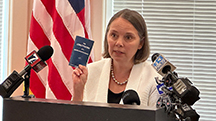 |
|||||||||||||||


Voter ID: Solving No Problems
Matt Dunlap, Maine State Auditor
Shenna Bellows, Maine Secretary of State
Wednesday, October 8, 2025 at 7:00 pm
View Zoom Presentation Below
Matt Dunlap
Shenna Bellows. Photo: Susan Cover, Spectrum News
Matt Dunlap of Old Town is Maine’s 23rd State Auditor. Prior to that, he served seven terms as the 47th and 49th Secretary of State and was in the Maine House of Representatives for four terms representing Old Town and the Indian Island Voting District, where he chaired the Joint Standing Committees on Inland Fisheries and Wildlife and Government Oversight, and was a member of the House Standing Committee on Elections. Dunlap’s work resulted in the development of the Lifetime Hunting and Fishing License endowment, the establishment of the Office of Program Evaluation and Governmental Accountability, the development of the Central Voter Registration system and Ranked-Choice Voting among many other policy developments.
Matt was a member of President Trump’s Advisory Commission on Election Integrity in 2017, which Trump dissolved after Dunlap successfully litigated that the Commission was not acting transparently or in good faith.
Along with his day job, Dunlap is President of the Board of the Bangor Symphony Orchestra, Treasurer of the New England Outdoor Writers Association, Chair of the Episcopal Diocesan Council on Indigenous Relations, is the last founding board member of the Maine Youth Fish and Game Association, and is also a member of the University of Maine Board of Visitors and the University of Maine “M” Club.
A former board member of the Sportsman’s Alliance of Maine, Matt served as Executive Director in between terms as Secretary of State. He is also an award-winning columnist for The Northwoods Sporting Journal. Previously, Dunlap served as a member of the Maine StateWabanaki Child Welfare Truth and Reconciliation Commission and many other boards and commissions. He holds a bachelor’s degree in history and a master’s degree in literature from the University of Maine, and resides in Old Town with his wife, the Hon. Michelle Dunphy, Assistant Clerk of the Maine House of Representatives. They have an adult child, Emily Dunlap of Levant, who is a University of Maine graduate and is the band director at the Nokomis Middle School in Newport.
Shenna Bellows is Maine’s 50th and first female Secretary of State. She’s led implementation of reforms like automatic voter registration and online voter registration in her state and has taken strong stands against Donald Trump – like when she ruled that he wasn’t eligible for the 2024 ballot because of his incitement of the insurrection of January 6. Bellows is used to speaking truth to power – and was Executive Director of the ACLU of Maine before she entered elected office. Shenna also understands the dangers this moment poses to our democracy, having led Maine’s Holocaust and Human Rights Center for several years.
Bellow was one of the leaders of Maine’s marriage equality campaign, and she and her husband waited to marry until their gay and lesbian friends and family could. She helped win that campaign by launching Republicans for the Freedom to Marry out of the ACLU even though she’s a Democrat, and that kind of bipartisan coalition building helped her turn a red district blue when she was elected to a state senate district that voted for her and Donald Trump in 2016. Growing up in rural Maine without electricity or running water made her Maine tough. In her spare time, she runs half-marathons or goes birdwatching in the Maine woods with her husband Brandon.
Vampires, Werewolves and Voter Fraud: Will Voter ID Succeed Where Garlic and Holy Water Have Failed? The “Voter ID for Maine” citizen’s initiative refuses to die and will be a referendum question on the November ballot. FOMB is highlighting this issue because we are a nation of laws and a long-running experiment in democracy. Key to experimental success or failure; whether in the crafting and enforcement of environmental laws or in other areas, is voter participation. We believe any measure that makes voter participation more difficult is the first step in the death of democracy and it matters not your political persuasion, participation is fundamental.
The League of Women Voters of Maine (LWVME) opposes this initiative, considering it a form of voter suppression. The voter ID requirement proposed by this campaign would be one of the most restrictive anywhere in the county. It would require photo ID to vote and to vote absentee, and it would exclude a number of currently accepted IDs.
But that’s not all. The legislation behind the referendum is also an attack on absentee voting. It will repeal ongoing absentee voting, where a voter can sign up to have an absentee ballot mailed to them automatically for each election cycle, and it limits the use and number of absentee ballot dropboxes to the point where some towns may find it impractical to offer them. It makes it impossible for voters to request an absentee ballot over the phone. It prevents an authorized third party from delivering an absentee ballot, a service that many elderly and disabled Mainers rely on.
Absentee voting is safe and secure and a popular way to vote for many Mainers. We should be looking for ways to make it more convenient for Maine voters to cast their ballots, not putting obstacles in their way. LWVME feels this campaign is a broad attack on voting rights that, if implemented, would disenfranchise many Maine people. It’s disappointing to see Mainers try to impose these barriers on their fellow Mainers’ right to vote when this state is justly proud of its high voter participation rates. These restrictions can and will harm every type of voter, with senior and rural voters experiencing the worst of the disenfranchisement. It will be costly, too. Taxpayers will be on the hook to pay for a new system that is unnecessary, expensive, and harmful to Maine voters.
All of the evidence suggests that voter IDs don’t prevent voter fraud. Maine has safeguards in place to prevent fraud, cyber attacks, and other kinds of foul play that would attempt to subvert our elections. This proposal is being imported to Maine from an out-of-state playbook (see the latest Ohio voter suppression law) that just doesn’t fit Maine. The “Voter ID for Maine” campaign will likely mislead Mainers into thinking that requiring an ID isn’t a big deal, but it will have immediate impacts on eligible voters. Unfortunately, that may be the whole point, and that’s what the proponents of this measure will likely refuse to admit.
Video of Presentation:
Watercolors by
Sarah Stapler
Sarah Stapler

